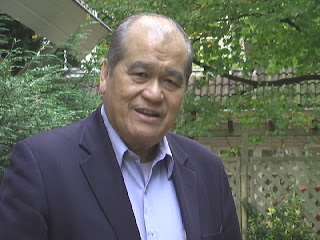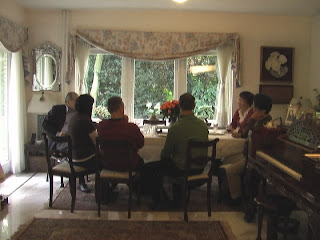



Drop-outs among OFW children on the rise
By LOUI GALICIA
ABS-CBN Europe News Bureau
A growing number of children left behind in the Philippines by overseas Filipino workers are losing interest in education and many are dropping out of school.
This was revealed by Tina Monzon-Palma, program director of ABS-CBN Foundation’s Bantay Bata 163, during her recent visit to the Netherlands to meet with a group of Pinoy professionals and nurses and Ambassador Romeo Arguelles. She said Bantay Bata has been receiving a lot of cases of children being heavily affected by the physical separation from parents working abroad.
"So nagkakaroon na kami ng iba’t ibang klaseng programa sa iba’t ibang probinsya para matugunan namin itong mga pangyayaring ito na sa palagay namin sa mga panahon na ito ay lumalaki at sana ay hindi na lumalala para hindi na lalong magkawatak- watak ang pamilyang Pilipino," Palma said in an exclusive interview at the ambassador's home in Wassenaar.
Palma said that a study conducted on how remittances are spent show that priorities among parents working abroad are healthcare, education and personal needs.
Some children, however, don’t feel the need to go to school anymore because of the money pouring in every month from abroad.
" 'Yung isang researcher na nagpunta sa isang lugar, nakita na mataas ang rate ng drop-out dun sa mga merong mga magulang na nasa abroad. Marangya, marami silang pera so parang di sila natuturuan. They don’t [feel the] need to go to school. The money is just forever being there," Palma said.
Palma said that Bantay Bata is trying to develop a special program to train these children on how to properly communicate with their parents.
"We put them into a training session of the children and the lolas and the auntie. How do you communicate with your mother or father in using the telephone or using the SMS. How do you strengthen that even in the absence, in the physical absence hoping it will fill the vacuum," Palma explained.
Palma said there seems to be a template of dialogue between a parent abroad and a child in the Philippines which is, "I need money," and that must be changed.
She said that Bantay Bata tries to tell the children that money isn’t everything in life.
They try to train the children to properly express their feelings about the absence of their parents and they also try to teach them how to save money, she said.
Palma reminded the Pinoy professionals that it’s not all about the money but the love.
The problem, she said, stems from lack of physical love and children whose parents are working abroad often feel the neglect and emotional emptiness.
Palma said that there are different languages of love and that parents who are working abroad are encouraged to use them in order to provide a security blanket for their children.
"Ang nakikita namin ay isang bukas at totoong pakikipag-usap sa mga anak. Ipaalam sa kanila na minamahal nila ang kanilang mga anak...Ito ay isang uri ng pagmamahal," Palma said.
Children, on the other hand, are also encouraged to tell their parents over the telephone or text message that they love them.
"Maski sila ay magkahiwalay ay maari pa silang magpakita ng pagmamahal at respeto sa isa’t isa sa tuloy na pakikipag-usap. Hindi lamang yung pag-uusap nila sa telepeno o pagtetext o pagsulat ay ukol sa pangangailangan nila na salapi para sila ay makabili ng panggimik nila, pagtustos ng kanilang pag-aaral kundi para na rin malaman nila ang halaga ng pera at ang halaga ng hirap na pinagdadaanan ng magulang para sila ay mamuhay ng matiwasay," Palma said.
Palma said that parents working abroad who have the habit of making up for their physical absence from home by bombarding their children with material things are using the wrong expression of love.
The OFWs should instead begin to teach their children how to save those hard-earned money at a very young age.
And most important of all, children and parents, just like any normal household should continue communicating with each other.
A Pinay who brought her Dutch husband and brother-in-law to the meeting said that it is very typical of a Filipino to help his fellow countryman.
"It’s really very Filipino! It’s really very Filipino and I am very happy for that. Maybe in my own little way, I can help also, in little things for Bantay Bata," Vicky de Bree-Ocampo said.
"They really make sure that these children are put in a nice place to help them and also to educate their parent and this is a very good example that ABS-CBN is doing now," de Bree-Ocampo added.
Arguelles, meanwhile, only had kind words for Bantay Bata.
"Bantay Bata is one of the more very successful programs, NGO program in the Philippines. And we’re very proud to have assisted in our small way the Bantay Bata project here in the Netherlands," Arguelles said.
"I think what is very useful here is for Tina to have informed the Filipinos here about the situation of the Filipinos back home in terms of those families that have their parents or relatives abroad and how Bantay Bata is able to assist these families in trying to unify and trying to solve some of the problems that are attendant to the absence of parents from their children," Arguelles said.
Arguelles was thankful that he opened his home to that very informative meeting which touched the hearts of the Pinoys because it gave them a glimpse of what is a reality, that money cannot buy, in the world of the OFWs.
SOURCE: WWW.ABS-CBNNEWS.COM
http://www.abs-cbnnews.com/storypage.aspx?StoryId=98505

No comments:
Post a Comment